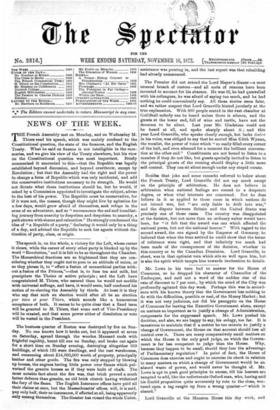Besides that joke and some remarks referred to below about
the French Treaty, Lord Granville did not say much except on the principle of arbitration. He does not believe in arbitration when national feelings are roused to a desperate degree, or when vital interests are concerned. But he does believe in it as applied to those cases in which nations do not intend war, but " are only liable to drift into war," and the dispute between Britain and the United States was precisely one of those cases. The country was disappointed at the decision, but not more than an ordinary suitor would have been, for "it felt that the award was one which affected the national purse, but not the national honour." With regard to the second award, the one signed by the Emperor of Germany, he believed that when the time arrived he could show that the terms of reference were right, and that infinitely too much had been made of the consequences of the decision, whether to this country or to the Canadian Dominion. Lord Granville, in short, was in that optimist vein which sits so well upon him, but is also the spirit which tempts him towards inattention to details.


































